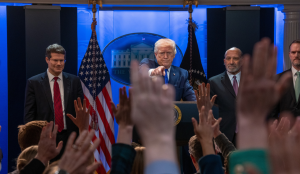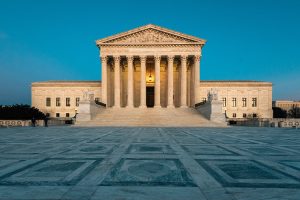
The Trump administration can distinguish itself by celebrating economic success. Dropping the Google and Meta appeals would be a good place to start.
By Mark Jamison | March 3, 2026

The friction points that compliance officers rely on, the remaining human-permission layers, are being engineered away. Before they disappear, policymakers must decide whether those constraints were inefficiencies to eliminate or…
By Shane Tews | Nicoletta Kolpakov | March 2, 2026

Rules and processes designed for a complicated world can’t be expected to succeed in a complex one. Product safety regimes assigning all risk to producers are not suitable for a…
By Bronwyn Howell | February 27, 2026

The GPS is essential to modern navigation, communication, and critical infrastructure. However, the United States faces serious threats to GPS technology, many of which are rarely discussed publicly. In addition…
| February 26, 2026

Daniel Lyons discussed spectrum access, BEAD program reforms, and subjects at the forefront of today's Internet policy debates in a fireside chat with Arielle Roth at SOTN 2026.
By Daniel Lyons | February 26, 2026

The theme song from H.R. Pufnstuf, a “fantastical” 1969 children’s television program, features the cryptic lyric “can’t do a little cause he can’t do enough.” Two recent federal court opinions—NetChoice…
By Clay Calvert | February 25, 2026

Drones have previously been confined due to limitations such as short battery lives and restricted load capacities. This is beginning to change. With SiFly recently breaking the world record with…
By Shane Tews | February 23, 2026

The Department of Labor framework is unashamedly instrumental: It aims to help workers safely use AI to stay productive rather than equip them as critical agents in shaping AI governance…
By Bronwyn Howell | February 20, 2026

The backlash against data centers is real, bipartisan, and accelerating. But the moratoria are blunt instruments aimed at a poorly defined target. They capture far more than hyperscale AI facilities,…
By Will Rinehart | February 19, 2026

I’ve written about this before, but it bears repeating: Should responsibility for kids’ online safety lie with operating systems and app stores, or with the applications themselves? At first glance,…
By Shane Tews | February 18, 2026

Prospective settlements in several lawsuits blaming conversational chatbots for causing minors to kill themselves aren’t likely to stop related claims from proceeding, with multiple forces driving litigation and settlements failing…
By Clay Calvert | February 17, 2026

For now, states appear to be moving cautiously, targeting obvious problems, and signaling attentiveness to constituents without overcommitting to rules they may soon regret. Whether that balance holds as AI…
By Mark Jamison | Fátima Palacios Figueroa | February 13, 2026

As AI agents become more capable, policy should aim less at picking winners in terms of protocol and more at preserving the conditions for open experimentation.
By Will Rinehart | February 12, 2026

You may have heard that the Supreme Court has agreed to take up an interesting Fourth Amendment case. Chatrie v. United States will examine whether the execution of a geofence…
By Jim Harper | February 11, 2026

A federal judge’s December ruling in NetChoice v. Griffin bars Arkansas from enforcing part of a new law that restricts the First Amendment rights of both social media users and…
By Clay Calvert | February 10, 2026